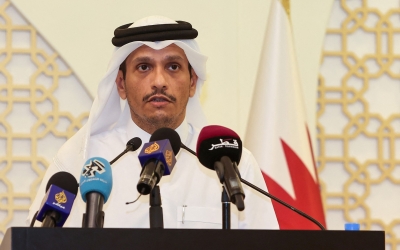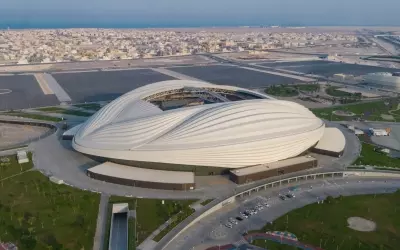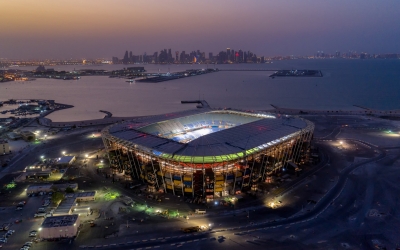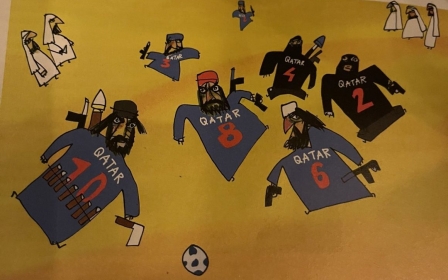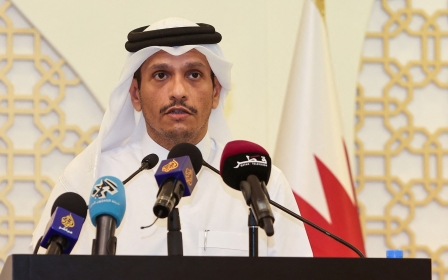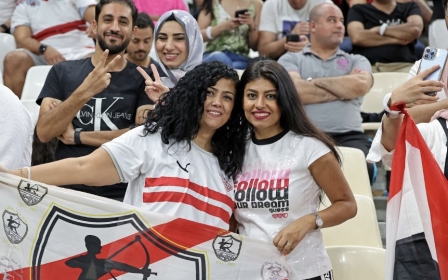Qatar World Cup 2022: A lost economic opportunity for Bahrain?
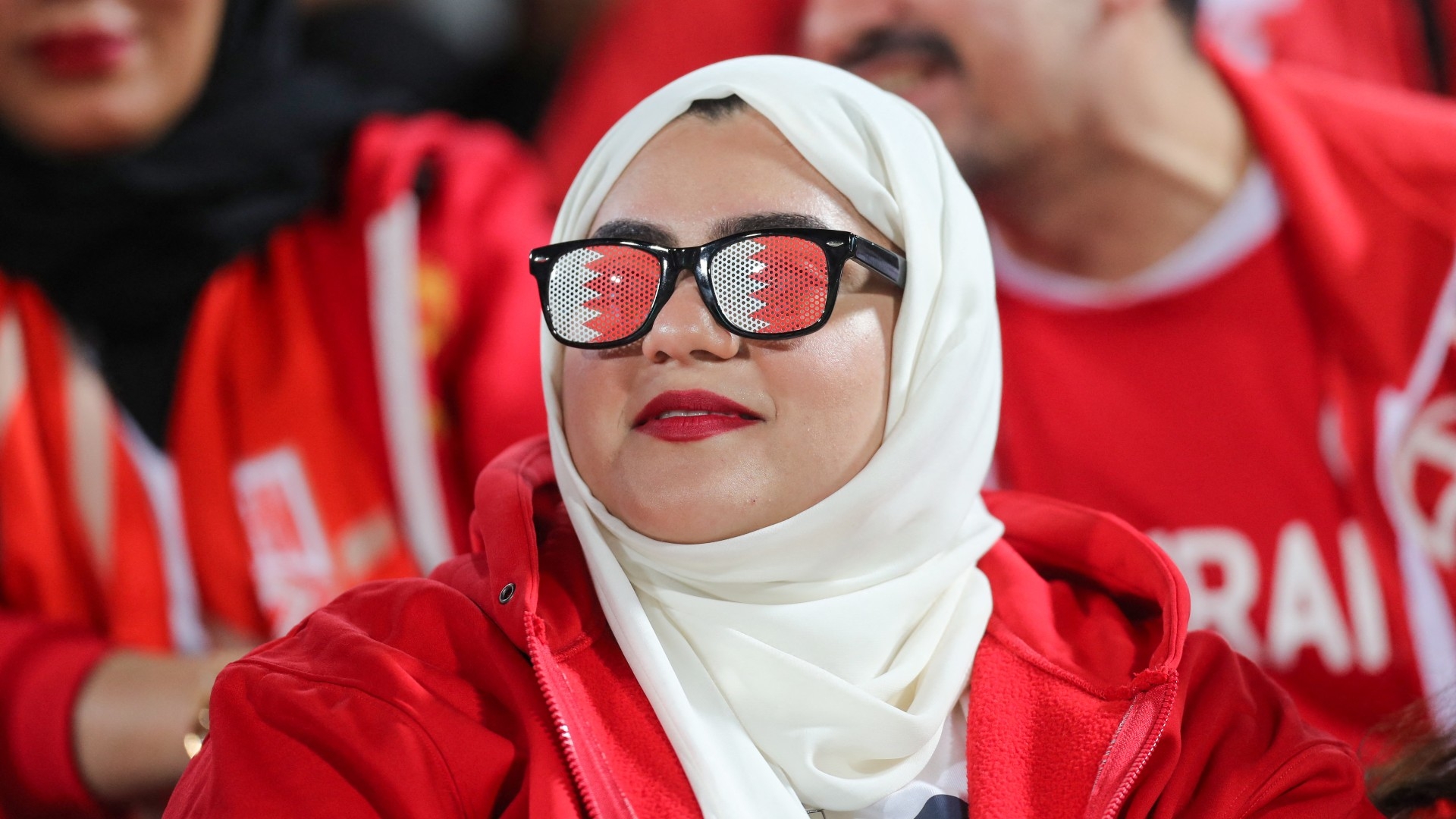
Football fever has engulfed much of the Middle East, but one Gulf Arab country doesn't appear to be too excited over the upcoming Qatar World Cup.
Every four years, the World Cup captivates the region's football fans and businesses for the better part of four weeks. It could be down to an Arab country's appearance, or revenues the tournament helps generate for local businesses.
And with just days until kick-off, countries which were once at odds with Qatar, are eagerly hoping to cash in on the sporting spectacle.
Gas-rich Qatar has spent an estimated $220bn on building world-class infrastructure, including new roads, public transport and sporting facilities - but a significant shortfall on hotels remains.
The Emirate of Dubai, which is just a 45-minute flight away, is expecting a last-minute surge in bookings as more than 1.2 million people prepare to descend on Qatar.
Dubai's hotels are offering special packages for fans and the emirate has prepared fan zones at parks, beaches and in the financial centre.
Meanwhile, neighbouring Saudi Arabia, which had largely cut itself off from tourism until it began issuing tourist visas in 2019, is offering those with Hayya cards the opportunity to visit the kingdom for 60 days.
But just a few nautical miles from Qatar there appears to be little fanfare in the Kingdom of Bahrain over the Middle East's first World Cup.
There are no direct flights, no fan zones, and little advertising for the tournament playing out a short trip across from its shores.
"Bahrain seems to have missed the World Cup opportunity, especially given its tourism-friendly hospitality sector," Kristian Coates Ulrichsen, a fellow for the Middle East at Rice University's Baker Institute, told Middle East Eye.
'Slow rapprochement'
Ties between Bahrain and Qatar have been tense in recent years and broke down completely in June 2017 following the Gulf diplomatic crisis.
Bahrain joined Egypt, Saudi Arabia and the United Arab Emirates (UAE) in cutting ties with Qatar and imposed a blockade on its neighbour over allegations that it supported "terrorism" and had close relations with Iran. Doha denied the charges and said the boycott was aimed at curtailing its independence.
'It just appears that the rapprochement process is going too slow for Bahraini businesses to reap anything out of the World Cup'
- Bahraini academic
Since last year's historic Gulf Cooperation Council (GCC) summit in Saudi Arabia's Al-Ula, which saw the official end to the rift, Qatar's ties with Egypt, Saudi Arabia, and to a lesser extent the UAE markedly improved. Despite the development, there hasn't been a real mending of relations between Doha and Manama.
Two weeks after the Al-Ula summit, Bahrain's Foreign Minister Abdullatif al-Zayani accused Qatar of not taking the "initiative" to solve its dispute with the kingdom.
"It is certainly the case that diplomatic and political relations between Bahrain and Qatar have been the slowest to improve," Ulrichsen said.
A UK-based Bahraini academic, who requested anonymity because of the sensitivity of the topic, said he wouldn't characterise Bahrain's attitude as a lack of enthusiasm.
"It is the World Cup, after all... [it] just appears that the rapprochement process is going too slow for Bahraini businesses to reap anything out of the World Cup."
Several people who spoke to MEE on condition of anonymity said there was a largely subdued World Cup mood in Manama, with residents struggling to gauge the government's attitude to the event.
A newspaper executive told MEE that there was an instruction from the Bahraini government to tone down coverage of World Cup events.
MEE reached out to the Bahraini embassy in London for comment but did not receive a response by time of publication.
According to the executive, World Cup sponsors who have business interests in the kingdom were also cautious about running print and outdoor ad campaigns because of fears over how the government would respond.
MEE reached out to five major sponsors of the tournament but did not receive a response by time of publication.
The newspaper executive added that his company had rented a stadium for the 2018 Russia World Cup and set up giant TV screens for football fans - but there was nothing of that scale planned for this year's event.
"Bahraini malls used to be abuzz [with excitement] when World Cups were held elsewhere. But now - even though the event is very close - there are no usual commercial rituals like the sale of discount TVs," he said.
Watching from home
Historically, Bahrain and Qatar have clashed over control of the Hawar and Janan islands as well as the town of Zubarah; as well as Al Jazeera's coverage of the 2011 Arab Spring uprising, and Qatar's decision to grant citizenship to Sunni Muslims from the Shia-majority kingdom.
A travel agent in Manama said the long-standing dispute meant that chances were slim of direct flights between the two countries.
'A chance to host World Cup fans could do well for Bahrain's economy and [there is] still hope it will happen'
- Kamal Mohiyuddin, realtor, Manama
According to Kamal Mohiyuddin, an Indian realtor in Manama, the issue of Bahraini fans' commuting to Qatar wasn't the only fallout from the absence of direct flights.
Shuttle services from Doha to Manama, the region's most permissive city with around 20,000 hotel rooms, would have benefitted everyone, he said.
"A chance to host World Cup fans could do well for Bahrain's economy and [there is] still hope it will happen," Mohiyuddin said.
"Bahrain's budget targeted 20 percent of revenue from tourism this year, and it has already achieved 18 percent," he said, citing a report that claimed a 984 percent increase in tourists' arrival in Bahrain in the first quarter of this year following the end of pandemic-related restrictions.
Oman's Ministry of Heritage and Tourism has said the World Cup is poised to "raise the profile of many regional destinations" and the financial upturn associated with the event could extend well after the tournament finishes.
In the first quarter of this year, 1.483m tourists entered Bahrain through the King Fahd causeway that connects the island nation with Saudi Arabia - compared with last year's 84,000, a huge growth attributed to the easing of Covid-19-related travel restrictions.
As a result, Qataris, too, were back in Bahrain. "I see a lot of Nissan Patrols [a favourite vehicle of Qatari nationals] with Qatari number plates here," a greengrocer told MEE.
He claimed this happened after Qatar's Emir Tamim bin Hamad Al Thani and Bahrain's King Hamad bin Isa Al Khalifa met on the sidelines of the Jeddah Summit in July.
The grocer said he saw news of the meeting through a screenshot of the banned dissident website Bahrain Mirror, which also reported that Manama removed Qatar from the list of countries that Bahrainis were forbidden from visiting.
"Whenever we see the photographs of Qatari and Bahraini leaders shaking hands and smiling, but still no air travel, we think they forgot to discuss the issue yet again," the grocer said.
Still, some fans said they would take the five-hour car journey to watch the matches live, while others would still celebrate the Arab world's first World Cup from the comfort of their homes.
"Some of us Bahrainis may be unable to come to Qatar, but we will watch all the games on TV," Ammar Ahmadi, a Bahraini business consultant, told MEE.
"We are ardent football fans, and it's a major sport here. I want to come to all the games that Brazil plays, but I didn't get a ticket."
Middle East Eye delivers independent and unrivalled coverage and analysis of the Middle East, North Africa and beyond. To learn more about republishing this content and the associated fees, please fill out this form. More about MEE can be found here.


